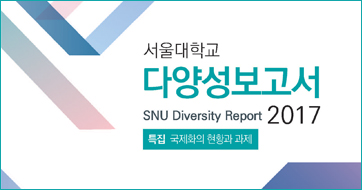News | Publication of the “SNU Diversity Report 2017”
18-10-25 16:11페이지 정보
작성자 관리자 작성일18-10-25 16:11 조회857회 댓글0건관련링크
본문

❑ Publication Objectives
○ Following the publication of the “SNU Diversity Report 2016” last year, the SNU Diversity Council (established Mar. 2016; chair: Professor Ki-Sun Hong of the Dept. of English Language and Literature) is publishing its second annual report. Its objectives are to examine the diversity of the members of the university community and evaluate the university’s support for academics, research, and everyday life on campus.
○ Through the inclusion of a special section on internationalization, the report is also intended to determine SNU’s current stage of internationalization and suggest systematic ways to improve it.
❑ Major Findings
○ Gender ratios among people – women make up 15.5% of full-time tenure-track faculty, 35.8% of undergraduate students
The report determined the gender ratios among all groups in the university. Women make up 35.8% of registered undergraduate and 44.5% of registered graduate students. This marks a slight increase in the percentage of women among graduate students since 2016, but the inequality in gender ratios among both students and full-time tenure-track faculty is still considerable. In contrast, the percentage of women among non-tenure-track faculty and researchers is relatively high at 45.7%. Similarly, women make up 50.0% of permanent staff, but 74.5% of unlimited contract staff and fixed-term contract staff.
○ Production of “diversity hiring” statistic for each academic department – 30.0% of all full-time tenure-track faculty are women, people who received their bachelor’s degree at another university, and/or not of South Korean nationality
This represents an 0.9% increase over last year’s figure of 29.1%. The largest group among the three represented in the statistic were people who received their undergraduate degree at another university. As there are 13 departments that have at least 10 full-time tenure-faculty among whom none are women, proactive efforts to increase the hiring of new female faculty are needed.
○ Representation of women in SNU’s decision-making bodies does not even reach half of that in central government committees
Female faculty hold just 10.4% of major appointed positions and make up just 16.3% of members of major committees and 11.1% of SNU Senate members. The “Framework Act on Gender Equality” recommends that at least 40.0% of the members of government committees be women, and central government committees achieved this goal in 2017.
○ People of other nationalities make up only 5.2% of full-time tenure track faculty, 1.0% of undergraduate students, 8.5% of graduate students
The recent increase in foreign members of the university community has slowed overall, but the trend continues steadily among master’s degree students. Around 15% of classes are conducted in a foreign language, and in the area of administrative services for international people, more English-language materials and specialist staff are needed.
○ Increase in percentage of domestic full-time tenure-track faculty who received their final degree at a domestic university
Among domestic full-time tenure-track faculty, 57.6% received their final degree at an overseas university and 42.4% received it at a domestic university. More specifically, 47.2% earned their final degree in the USA, 42.4% in South Korea, 2.9% in Germany, 2.2% in the United Kingdom, and 2.1% in Japan. By rank, 41.5% of full professors, 45.5% of associate professors, and 45.0% of assistant professors received their final degree at a domestic university, which suggests that the percentage of such faculty is rising over time.
○ Lively domestic and international student exchange – 1,000 students per year going abroad as exchange students or for short-term study
Roughly 800 students came from overseas as exchange or visiting students or to participate in the SNU International Summer Program. SNU sent a higher number of its students overseas—300 as exchange students, 377 as SNU in the World Program participants, and 635 as SNU Global Volunteers. On the other hand, the Domestic University Credit Exchange Program brought 1,312 students of other universities to study at SNU, while just 282 SNU students used it to study at other universities.
❑ Suggested Action Plans
○ Short-term (1-2 year) suggestions
- Devise practical measures to improve gender equality in decision-making bodies
- Require departments with no or very few female faculty members to make hiring plans for female faculty
- Because the percentage of international members of the university community has plateaued and related improvements to administrative services and organizational culture are being delayed, take multi-faceted steps to improve internationalization
○ Medium- and long-term (3-5 year) suggestions
- Make long-term development strategies and step-by-step action plans to increase internationalization
- Develop a diversity education program
- Set the protection and promotion of diversity as one of the major objectives to be pursued while making the university’s operating plans, and make efforts to reflect diversity indicators in the university’s overall operations
댓글목록
등록된 댓글이 없습니다.